Suchergebnisse
Zukunftsquartier 2.0 - Replizierbare, thermisch und elektrisch netzdienliche Konzeption von (Plus-Energie) Quartieren im dichten urbanen Kontext
Entwicklung eines replizierbaren Konzepts zur netzdienlichen Integration von innovativen (Plus-Energie-) Quartieren mit hoher Vor-Ort- Energieaufbringung in die bestehende Netzinfrastruktur (Strom- und Fernwärmenetz).
The Green Parking Space – Nutzung von städtischen Verkehrsflächen für die Produktion von Biomasse
Zahlreiche Verkehrsflächen im städtischen Umfeld werden nur einen geringen Teil der Zeit tatsächlich genutzt. Inhalt dieses Projekt war, die Möglichkeit zu untersuchen, solche Flächen durch Integration von Photobioreaktoren zusätzlich zur Produktion von Biomasse zu nutzen und die Systeme möglichst vollständig in die urbanen Stoff- und Energiekreisläufe einzubinden.
The Green Parking Space – Utilization of urban parking areas for production of biomass
Many traffic areas in urban environments are actually used as such only a small fraction of the time. Subject of this project was to investigate the possibility of using those areas by additional integration of photobioreactors for the production of biomass, integrating such systems to the maximum extent into the urban substance and energy cycles.
SC_MIKROQUARTIERE - Energie- und lebensqualitätsoptimierte Planung und Modernisierung von Smart City–Quartieren
Das Projekt SC_Mikroquartiere zeigt Möglichkeiten der Stadtplanung für eine quartiersweise Entwicklung hin zu einer Low-Carbon City mit hoher Lebensqualität und guter Resilienz unter Berücksichtigung vorhandener und geplanter Gebäude, Infrastruktur und Nutzung. Das zentrale Element ist die Modellierung von Stadtstrukturen auf Mikroquartiersebene.
SC_micro-quarters – Planning and modernisation of smart city quarters with a view to energy optimisation and a high quality of life
The SC_micro-quarters project demonstrates possibilities for urban planning and urban quarter development with a view to creating a path to a low carbon city with a high quality of life and good resilience, while taking into account existing and proposed buildings, infrastructures and uses. The central element is the modelling of urban structures at micro-quarter level.
Future quarter 2.0 - Replicable, thermally and electrically grid-supportive conception of (positive energy) districts in a dense urban context
Development of a replicable concept for grid-supportive integration of innovative (positive energy) district with high on-site energy supply into the existing network infrastructure (electricity and district heating network).
VERTICALurbanFACTORY: Innovative Konzepte der vertikalen Verdichtung von Produktion und Stadt
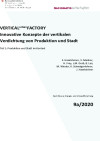
Das Projekt beforscht Möglichkeiten und Potenziale hocheffizienter Raumnutzung durch moderne Konzepte „gestapelter“ Funktionen und vertikaler Produktion.
Schriftenreihe
9/2020
E. Haselsteiner, V. Madner, H. Frey, L.M. Grob, B. Laa, M. Winder, K. Schwaigerlehner, J. Haselsteiner
Herausgeber: BMK
Deutsch, 253, 153 bzw. 52 Seiten
Downloads zur Publikation
Ergebnisband "Sanierung"
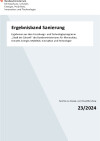
Der vorliegende Ergebnisband stellt abgeschlossene Projekte aus dem Forschungs- und Technologieprogramm „Stadt der Zukunft“ des Bundesministeriums für Klimaschutz, Umwelt, Energie, Mobilität, Innovation und Technologie (BMK) im Bereich innovativer Gebäudetechnologien vor. Die gewonnenen Erkenntnisse sollen eine Entwicklung in Richtung energieeffiziente und klimaverträgliche Stadt unterstützen, die auch dazu beiträgt, die Lebensqualität und die wirtschaftliche Standortattraktivität zu erhöhen.
Schriftenreihe
23/2024
Bianca Pfefferer
Herausgeber: BMK
Deutsch, 28 Seiten
Downloads zur Publikation
Ergebnisband „Urban Data Management“
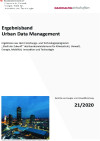
Der vorliegende Ergebnisband stellt abgeschlossene Projekte aus dem Forschungs- und Technologieprogramm „Stadt der Zukunft“ des Bundesministeriums für Klimaschutz, Umwelt, Energie, Mobilität, Innovation und Technologie (BMK) im Bereich Urban Data Management vor. Die gewonnenen Erkenntnisse sollen eine Entwicklung in Richtung energieeffiziente und klimaverträgliche Stadt unterstützen, die auch dazu beiträgt, die Lebensqualität und die wirtschaftliche Standortattraktivität zu erhöhen.
Schriftenreihe
21/2020
Redaktionelle Gestaltung: Bianca Pfefferer, Hannes Warmuth (ÖGUT)
Herausgeber: BMK
Deutsch, 24 Seiten
Downloads zur Publikation
Ergebnisband „Klimaneutrale Städte"
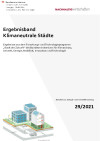
Der vorliegende Ergebnisband stellt abgeschlossene Projekte aus dem Forschungs- und Technologieprogramm „Stadt der Zukunft“ des Bundesministeriums für Klimaschutz, Umwelt, Energie, Mobilität, Innovation und Technologie (BMK) im Bereich Klimaneutrale Städte vor. Die gewonnenen Erkenntnisse sollen eine Entwicklung in Richtung energieeffiziente und klimaverträgliche Stadt unterstützen, die auch dazu beiträgt, die Lebensqualität und die wirtschaftliche Standortattraktivität zu erhöhen.
Schriftenreihe
29/2021
Redaktionelle Gestaltung: Bianca Pfefferer, Hannes Warmuth (ÖGUT)
Herausgeber: BMK
Deutsch, 22 Seiten
Downloads zur Publikation
Ergebnisband „Gebäudetechnologien“
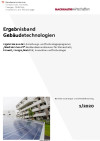
Der vorliegende Ergebnisband stellt abgeschlossene Projekte aus dem Forschungs- und Technologieprogramm „Stadt der Zukunft“ des Bundesministeriums für Klimaschutz, Umwelt, Energie, Mobilität, Innovation und Technologie (BMK) im Bereich innovativer Gebäudetechnologien vor. Die gewonnenen Erkenntnisse sollen eine Entwicklung in Richtung energieeffiziente und klimaverträgliche Stadt unterstützen, die auch dazu beiträgt, die Lebensqualität und die wirtschaftliche Standortattraktivität zu erhöhen.
Schriftenreihe
1/2020
Redaktionelle Gestaltung: Bianca Pfefferer, Hannes Warmuth (ÖGUT)
Herausgeber: BMK, Aktualisierung: Mai 2021
Deutsch, 25 Seiten
Downloads zur Publikation
Ergebnisband „Urbane Wärme und Kälte“
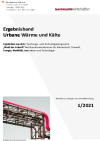
Der vorliegende Ergebnisband stellt abgeschlossene Projekte aus dem Forschungs- und Technologieprogramm „Stadt der Zukunft“ des Bundesministeriums für Klimaschutz, Umwelt, Energie, Mobilität, Innovation und Technologie (BMK) im Bereich Urbane Wärme und Kälte vor. Die gewonnenen Erkenntnisse sollen eine Entwicklung in Richtung energieeffiziente und klimaverträgliche Stadt unterstützen, die auch dazu beiträgt, die Lebensqualität und die wirtschaftliche Standortattraktivität zu erhöhen.
Schriftenreihe
1/2021
Redaktionelle Gestaltung: Bianca Pfefferer, Hannes Warmuth (ÖGUT)
Herausgeber: BMK
Deutsch, 24 Seiten
Downloads zur Publikation
Programmmanagement und Kommunikation in der missionsorientierten Forschungsförderung
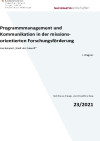
Diese Studie stellt sich die Frage, wie Programmmanagement und Wissenskommunikation in der missionsorientierten, angewandten Forschung konzipiert und effektiv umgesetzt werden können. Mittels Literatur- und Dokumentenanalyse, Stakeholderanalyse, internationaler Fallstudien, Interviews, Fokusgruppen sowie einem Co-Creationworkshop wurden Rückschlüsse auf die aktuelle Wirkung der Kommunikationsdimensionen des Programmes "Stadt der Zukunft" gezogen und Überlegungen hinsichtlich der Weiterentwicklungsmöglichkeiten zu Missionsorientierung nach OECD-Definition angestellt. Das resultierende Modell wurde in einem finalen Reflexionsworkshop mit dem Auftraggeber diskutiert.
Schriftenreihe
23/2021
I. Wagner
Herausgeber: BMK
Deutsch, 92 Seiten
Downloads zur Publikation
HEDWIG - Erhebung von Mess-Daten zur Wirkungsabschätzung von begrünten Gebäuden
HEDWIG verfolgt die Erfassung und Einschätzung der Wirkung von Grünfassaden und -dächern an Gebäuden anhand von Mikroklima- und bauphysikalisch relevanten Daten aus Dauermessungen. Ziel ist die Definition fundierter Vegetationsparameter und Leistungskennwerte auf Innen-, Außen- sowie mikroklimatisch relevanter Stadtraumebene. Es werden Standardkennwerte sowie ein Ablaufschema für standardisierbare Auswertungsverfahren vorliegen.
Eco.District.Heat - Potentials and restrictions of grid-bound heating systems of urban areas
Aim of the project Eco.District.Heat is to provide strategic decision-making support that enables Austrian towns and cities to deal with aspects of grid-bound heating (and cooling) systems in accordance with integrated spatial and energy planning from a holistic perspective when elaborating urban energy concepts.
HEDWIG - Collection of measurement data to assess the impact of green buildings
HEDWIG aims for the assessment of effects from green roofs and facades on buildings by using monitoring data referring to microclimate and building physics. The objective is to define validated vegetation parameters and performance indicators on indoor and outdoor level and on microclimatic relevant street space level. Standardised indicators, evaluation and analysis procedures will be elaborated.
Eco.District.Heat - Potenziale und Restriktionen leitungsgebundener Wärmeversorgung in Stadtquartieren
Ziel des Projektes Eco.District.Heat ist es, eine strategische Entscheidungshilfe für österreichische Städte zu entwickeln, mit der das Themengebiet leitungsgebundene Wärme- (und Kälte-) Versorgung in städtischen Energiekonzepten in Abstimmung mit energieraumplanerischen Fragestellungen aus ganzheitlicher Perspektive bearbeitet werden kann.
